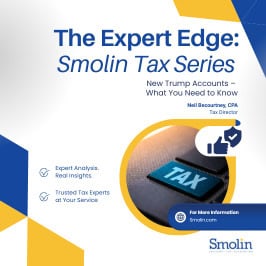The IRS is opening the filing season for 2025 individual income tax returns on January 26. This is about the same time as when the agency began accepting and processing 2024 tax year returns last year, despite IRS staffing having been significantly reduced since then. Here are answers to some FAQs about filing.
When is my 2025 return due?
For most individual taxpayers, the deadline to file a 2025 return or an extension is April 15. Individuals living outside the United States and Puerto Rico or serving in the military outside those two locations have until June 15.
When must 2025 W-2s and 1099s be provided to me?
To file your tax return, you need all your Forms W-2 and 1099. February 2 is the deadline for employers to issue 2025 W-2s to employees and, generally, for businesses to issue Forms 1099 to recipients of any 2025 interest, dividend or reportable miscellaneous income payments (including those made to independent contractors).
Normally these forms must be furnished by January 31. But this year, that date falls on a Saturday. So the deadline is the next business day, which is Monday, February 2.
If you haven’t received a W-2 or 1099 by the deadline, contact the entity that should have issued it. But remember that if a form is provided to you via mail instead of digitally, February 2 is the postmark deadline. So you might not receive it until several days after that.
Are there benefits to filing early?
One benefit is that if you’re getting a refund, you’ll likely get it sooner. The IRS expects to issue most refunds in less than 21 days from filing, as it has in recent years.
However, it’s possible that the reduced IRS staffing could cause delays during tax season this year. Other factors could also impact refund timing. The IRS cautions taxpayers not to rely on receiving a refund by a certain date, especially when making major purchases or paying bills.
How can filing early reduce my tax identity theft risk?
Tax identity theft occurs when someone uses your personal information — such as your Social Security number — to file a fraudulent tax return and claim a refund in your name. One of the simplest yet most effective ways to protect yourself from this type of fraud is to file your tax return as early as possible.
The IRS processes returns on a first-come, first-served basis. Once your legitimate return is in the system, thieves will have a tougher time filing a false return under your identity.
What’s the impact of the paper check phaseout for refunds?
As required by Executive Order 14247, the IRS is phasing out paper tax refund checks for individual taxpayers. For the 2025 tax year, the IRS will request banking information on all tax returns when filed to issue refunds via direct deposit or electronic funds transfer (EFT). For taxpayers without bank accounts, options such as prepaid debit cards, digital wallets or limited exceptions will be available.
Direct deposits and EFTs generally speed up refunds. They also avoid the risk that a paper check could be lost, stolen or returned to the IRS as undeliverable.
If I file early and owe tax, will I have to pay it when I file?
Even if you file early, your deadline for paying tax owed is April 15. However, if you didn’t pay enough in withholding and estimated tax payments for 2025 to meet certain rules (or didn’t make estimated tax payments on time), you could still owe penalties and interest. Paying before April 15 may reduce them.
What if I can’t pay my tax bill in full by April 15?
If you don’t pay what you owe by April 15, you’ll likely be subject to penalties and interest even if you met the withholding and estimated tax payment requirements for 2025. You should still file your return on time (or file for an extension) because there are failure-to-file penalties in addition to failure-to-pay penalties.
Paying as much as possible by April 15 will reduce interest and penalties because a smaller amount will be outstanding. Then request an installment payment plan for the rest of the liability.
Under what circumstances can I file for extension?
Generally, anyone is eligible to file an automatic extension to October 15 for individual tax returns; you don’t have to provide a reason why you can’t file on time. But you must file Form 4868 to request the extension by April 15 to avoid being subject to a failure-to-file penalty.
Remember that an extension of time to file your return doesn’t grant you any extension of time to pay your taxes. You should estimate and pay any taxes owed by April 15 to help avoid, or at least minimize, late payment penalties and interest.
What should I do next?
Contact a Smolin Representative to answer any other tax filing questions you have or to discuss getting started on your 2025 return. We can prepare your return accurately and on time while helping to ensure you claim all the tax breaks you’re entitled to.









